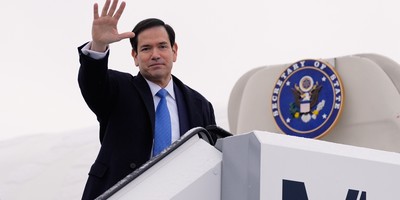The idea holding together the conservative movement since the 1960s was called "fusionism." The concept, which always worked better as an organizing principle than a philosophical one, was that freedom and virtue were inextricably linked. Virtue not freely chosen wasn't virtuous. Or as Frank Meyer, the foremost architect of fusionism, put it: "Truth withers when freedom dies, however righteous the authority that kills it; and free individualism uninformed by moral value rots at its core and soon brings about conditions that pave the way for surrender to tyranny."
This idea may have passed its sell-by date.
The intellectual right (like the intellectual left) has always had more internal fault lines than outside observers realized. These cracks were mostly paved over by opposition to communism throughout the Cold War, but they started to re-emerge once the Berlin Wall fell. Pat Buchanan's 1992 call to revive the "Old Right" vision of economic protectionism and socially conservative statism was more of a harbinger of the un-fusing of fusionism than was widely appreciated at the time.
Today, conservative forces concerned with freedom and virtue are pulling apart. The catalyst is a sprawling coalition of self-described nationalists, Catholic integralists, protectionists, economic planners and others who are increasingly rallying around something called "post-liberal" conservativism. By "liberal," they don't mean contemporary progressivism as represented by the Democratic Party. No, they mean classical liberalism, the Enlightenment worldview held by the Founding Fathers.
What the post-liberals want is hard to summarize beyond generalities. They seek a federal government that cares more about pursuing the "highest good" than protecting the "libertarian" (their word) system of individual rights and free markets.
On the other side are more familiar conservatives who, like George Will in his brilliant new book, "The Conservative Sensibility," still rally to the banner of classical liberalism and its philosophy of natural rights and equality under the law.
Recommended
"American conservatism has a clear mission: It is to conserve, by articulating and demonstrating the continuing pertinence of, the Founders' thinking," Will writes.
The match that lighted the current conflagration was a tweet and then an essay by Sohrab Ahmari, the Iranian-born op-ed editor of the New York Post, who is a passionate convert to Catholicism. Outraged by an ad for a "Drag Queen Story Hour" at a Sacramento-area library, Ahmari lashed out not at the event organizers, but at conservative writer David French for somehow representing conservatism's failures to prevent such moral slippage in our culture.
French, for those who don't know him, is a devout Christian conservative who, prior to becoming a full-time writer for National Review, spent most of his career as a prominent litigator fighting for religious liberty and free speech on college campuses.
French's allies -- including me -- saw Ahmari's attack in the pages of the journal First Things as a kind of character assassination. His description of French as a conservative quisling more eager to get along with the left than to fight it bore little resemblance to the man. French is an almost inexplicable bogeyman for the post-liberals save for the fact that he objects to the win-at-all-costs crudity of President Trump. Post-liberals like Ahmari see Trump's pugnaciousness as a key to victory in the culture wars.
L'affaire French is now in its third week. But this intellectual mud fight really isn't about either man. It's about what conservatism will mean after Trump is gone from the scene.
The post-liberals think that Enlightenment-based liberalism is the disease afflicting society because it has no answer for how people should live. They have a point: It is not a religion or moral philosophy. But it wasn't meant to be. Instead, as National Review's Charles Cooke rightly put it, classical liberalism was a system designed to keep people of different religions from killing each other.
This framing, however, obscures the path to reconciliation not just among the battling conservatives but in America generally.
The liberalism of the Founders focused on freedom for individuals -- but also encompassed institutions and communities. In the early days of the republic, for instance, some states had established churches and others didn't. What the Founders opposed was a one-size-fits-all approach from the top.
As far as I can tell, the so-called post-liberals now want Washington to dictate how we should all pursue happiness, just so long as it's from the right. In a country of nearly 330 million people, however, it is impossible to define the "highest good" for everybody.
Where the post-liberals have a point is that humans are happiest in communities, families and institutions of faith. The solution to the culture wars is to allow more freedom for these "little platoons" of civil society from which people draw a sense of meaning and belonging. If Sacramento wants Drag Queen Story Hour, so be it. If some other community holds a socially conservative story hour, that's fine too.
What America needs is less talk of national unity -- from the left or the right -- and more freedom to let people live the way they want to live, not just as individuals, but as members of local communities. We don't need to move past liberalism, we need to return to it.

























Join the conversation as a VIP Member